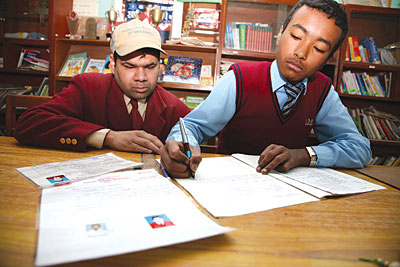 MIN RATNA BAJRACHARYA |
One of the least discussed aspects of human rights situation in Nepal is the condition of children with disabilities and their right to education despite laws guaranteeing it. They face diverse and imposing barriers to get even basic education in the country.
The New York-based Human Rights Watch (HRW) pointed that out by releasing a report during a press conference in Kathmandu on Wednesday and emphasised that children with disabilities also have right to education.
'Future Stolen: Barriers to Education for Children with Disabilities in Nepal' documents the hurdles that children with disabilities face in getting quality education in the country. Some of these children experience abuse and neglect at home and in their communities, making it harder for them to gain access to schooling. In addition to this, the schools do not have ramps to allow easier passage of children with disabilities into classrooms and teachers are inadequately trained, Human Rights Watch found.
All this results in low attendance and high dropout rates for children with disabilities compared with non-disabled children, the report noted.
The 76-page report was based on interviews, the rights body said, with nearly 100 disability advocates, teachers, government officials, and children or young people with disabilities and their families during a seven-month period.
Although the Nepal government has an inclusive education policy which requires communities to provide education to all children without discrimination, many children with disabilities are not provided the support they need to attend community schools.
"Tens of thousands of children with disabilities in Nepal are being shut out from or neglected by the school system," said Shantha Rau Barriga, of Human Rights Watch. "The Nepali education system needs to offer appropriate, quality education to all children, including those with disabilities."
Nepal has segregated, and often inferior, classes for children with disabilities, and separate schools for children who have physical, sensory, or intellectual disabilities, the rights organization said, adding that "an inclusive approach to education can boost learning for all students and combat harmful stereotypes of people with disabilities". HRW suggested that the government needs to rethink the use of special resource classes, which are intended as a transition to mainstream schools.
It also said that international donors and United Nations agencies have not done enough to ensure that funding for education is distributed without discrimination and equitably benefits children with disabilities.
In its report, HRW made recommendations as well. The government should revise teacher training materials, train all teachers about inclusive education methods, and improve monitoring of access to and the effectiveness of education for children with disabilities, it said. The government and donors need to work together to develop awareness-raising and educational campaigns about the right to education and other rights of people with disabilities.
It also urged the parliament to comprehensively review all domestic legislation and make amendments to comply fully with the UN Convention on the Rights of Persons with Disabilities, Human Rights Watch said.
Damakant Jayshi
Slideshow:
http://www.hrw.org/features/nepal-access-education-children-disabilities


